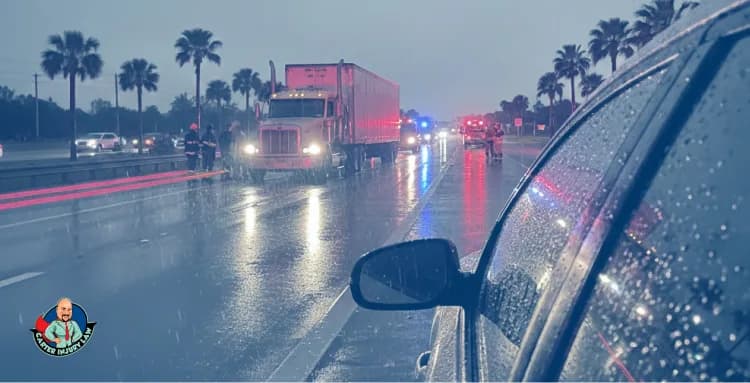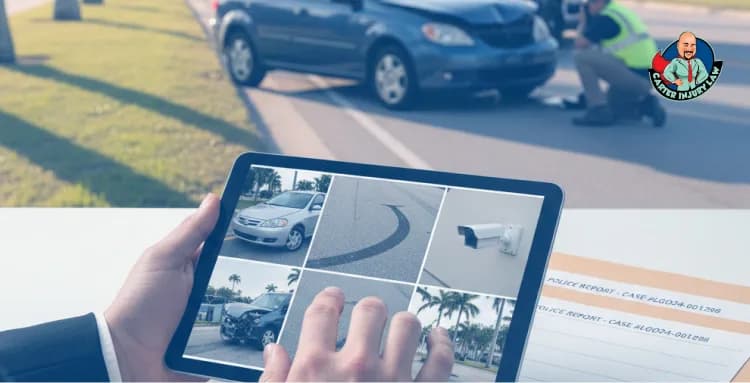There’s a certain script everyone expects after a work injury. You get hurt, you report it, you file for workers’ comp, and then you wait. Maybe the checks come through. Maybe they don’t. Either way, most people assume that’s the end of the story.
However, there are times when another thread is hidden in the background. A careless delivery driver. A contractor who didn’t follow protocol. A company that made a tool that never should’ve passed inspection.
And suddenly, the question changes. It's no longer just about how you got hurt, but also about who else could be to blame.
So before you close the book on your case, here’s what you need to know…
1) What Is a Third-Party Work Injury in Florida?
When you're hurt on the job, your mind usually goes straight to your employer. However, in Florida, not every work injury starts or ends there. Sometimes, the real problem comes from outside your company walls.
A “third party” just means someone who isn’t your employer or a coworker. Think of the extra players on the field. A subcontractor rushing a job. A distracted driver who hits you while you’re on a delivery route. A property manager who never fixed that stair railing. Even the company that made the defective tool in your hand when things went sideways.
These are the folks who can be held legally responsible in what’s called a third party work injury Florida claim. And they show up more often than you'd think.
Over 1 in 5 construction injuries involve a third party's negligence (Bureau of Labor Statistics). So if someone else’s mistake set off the chain of events that landed you in pain, you may have more than just a workers’ comp claim on your hands.
Let’s look at how that works and what makes it so different from the standard route.
2) Workers’ Comp vs. Suing a Third Party: What’s the Difference?
Workers’ comp is built to move quickly. You don’t have to prove fault, and in theory, you start getting help right away. It usually covers your medical treatment and a portion of your lost wages. However, workers’ comp doesn’t cover pain and suffering. It also doesn’t pay for everything you’ve missed, financially or otherwise.
A third-party claim comes into play at this point.
If someone outside your company caused the injury, you may be able to sue them directly. And that opens the door to compensation that actually reflects what you’ve been through. Full lost wages. Ongoing pain. Emotional distress. Even punitive damages if their actions were reckless enough.
You don’t have to pick one or the other. In many cases, you can pursue workers compensation and a third-party claim together. However, these cases get mixed up fast when insurance companies start fighting over who owes what.
Florida’s average workers’ comp payout lands between $20,000 and $40,000. Third-party settlements often go well beyond $100,000 (Florida Division of Workers’ Compensation Annual Report).
So how do you know if you can sue someone else? The next part’s where the story gets clearer.
3) When Can You Sue a Third Party for a Work Injury in Florida?
Not every work injury opens the door to a third-party claim. There are a few clear conditions that have to line up and when they do, it’s usually because someone outside your workplace made a preventable mistake.
Here’s the general rule:
That person or company had a responsibility to act with care.
They didn’t.
Their negligence directly led to your injury.
And they aren’t your employer.
Simple enough in theory. In real life, it shows up in all sorts of ways.
Maybe you slipped on a slick floor at a job site leased by another company. Maybe you were T-boned in traffic while making a delivery. Or maybe a scaffold collapsed beneath you because it was poorly designed or never inspected properly.
Each of these situations involves a third party stepping into a role they weren’t supposed to play, often with painful results.
Florida is one of the top 5 states where third-party liability claims arise in workplace injury cases (National Safety Council).
So, if something about your accident feels out of place, as if it came from somewhere else, it's time to investigate further. The next question is whether you can recover through both systems at once. And how to do it without losing your footing.
4) Can You Sue and Get Workers’ Comp at the Same Time?
The brief response is "yes." You can pursue both. However, like most things in law, there’s a catch hidden in the fine print.
If you file a third-party lawsuit and win or settle, part of that money might have to go back to the workers’ comp insurer. It's called subrogation, which is a fancy word for reimbursement. Basically, if your employer’s insurance already paid for your treatment or lost wages, they’ll likely want a portion of that back if someone else is held responsible.
That doesn’t mean you walk away empty handed. It just means the final math matters.
A skilled attorney can often reduce that repayment or restructure the settlement so you still walk away with more than what workers’ comp alone would’ve offered. This is where experience pays off, quite literally.
And if you’re wondering whether time is on your side with this kind of claim, that brings us to something most people overlook until it’s too late.
5) Florida's Legal Deadlines: Do Not Wait Too Long.
In Florida, you’ve got 30 days to report a work injury to your employer if you plan to claim workers’ comp. That clock starts ticking the moment you get hurt, even if you’re hoping the pain will just go away.
For a third-party lawsuit, the window is 4 years from the date of the injury. Still, that doesn’t mean you should wait around.
Job site videos get erased. Witnesses forget what they saw or move on. The longer you wait, the harder it becomes to connect the dots in a way that holds up in court.
Acting early helps preserve both claims. It gives your attorney the time to secure evidence, notify the right parties, and build a case with clarity instead of chaos.
And if this is already starting to feel like a lot to sort out, that’s a good sign it’s time to call in someone who knows how to do exactly that. Let's talk about why that's important next.
6) Why Third-Party Claims Are Tough to Handle on Your Own
On paper, a third-party claim might appear simple. Someone outside your company caused your injury, and you want them held accountable. But once insurance adjusters and corporate lawyers enter the picture, things rarely stay that straightforward.
Third-party insurers are quick to deny responsibility or downplay what you’ve been through. Add in workers’ comp on the other side, and now you’ve got two systems with their own rules, forms, deadlines, and fine print working on parallel tracks. And neither is known for making things easy.
Blame can bounce between parties. A contractor might point fingers at a property manager. A manufacturer might argue the equipment was misused. Meanwhile, you're caught in the middle, trying to recover while everyone else tries to avoid paying.
In cases like these, one missed deadline or overlooked form isn’t just a paperwork problem. It could mean losing tens of thousands of dollars you’d otherwise be entitled to.
That's where the right legal team can take over, fix the mess, and keep your claim moving forward, allowing you to focus on getting well rather than arguing over liability.
And if you’re wondering who to trust with that job, let’s introduce you to a team that does this work every single day.
Check out these related blogs to refresh your insights.
7) Call Carter Injury Law: We Handle These Cases Every Day
When it comes to workplace injuries in Florida, Carter Injury Law knows the terrain inside and out. Serious work injuries are complicated, especially when third parties are involved and that’s exactly where we focus our expertise.
We don’t handle workers’ compensation or third-party claims separately. We manage both together, making sure your case gets the full attention it deserves without sending you from one office to another. It’s one team, one plan, working to get you the best possible outcome.
We understand that reaching out can feel overwhelming, so we offer free, confidential consultations. And you don’t pay us unless we win your case. That means we’re invested in your recovery just as much as you are.












